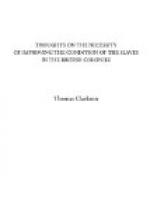Among his plantation offences was idleness on the part of the labourer. A man was not to receive wages from his master, and to do nothing. He was obliged to perform a reasonable quantity of work, or be punished. Another offence was absence without leave, which was considered as desertion.
Toussaint differed from the commissioners, as to the length of time for which labourers should engage themselves to masters. He thought it unwise to allow the former, in the infancy of their liberty, to get notions of change and rambling at the end of every year. He ordained, therefore, that they should be attached to the plantations, and made, though free labourers, a sort of adscripti glebae for five years.
He differed again from the commissioners, as to the quantum of compensation for their labour. He thought one-third of the produce too much, seeing that the planter had another third to pay to the Government. He ordered, therefore, one-fourth to the labourer, but this was in the case only, where the labourer clothed and maintained himself: where he did not do this, he was entitled to a fourth only nominally, for out of this his master was to make a deduction for board and clothing.
The above is all I have been able to collect of the code of Toussaint, which, under his auspices, had the surprising effect of preserving tranquillity and order, and of keeping up a spirit of industry on the plantations of St. Domingo, at a time when only idleness and anarchy were to have been expected. It was in force when Leclerc arrived with his invading army, and it continued in force when the French army were beaten and Negro-liberty confirmed. From Toussaint it passed to Dessalines, and from Dessalines to Christophe and Petion, and from the two latter to Boyer; and it is the code therefore which regulates, and I believe with but very little variation, the relative situation of master and servant in husbandry at this present hour.
But it is time that I should now wind up the case before us. And, first, will any one say that this case is not analogous to that which we have in contemplation? Let us remember that the number of slaves liberated by the French decrees in St. Domingo was very little short of 500,000 persons, and that this was nearly equal to the number of all the slaves then in the British West Indian Islands when put together. But if there be a want of




